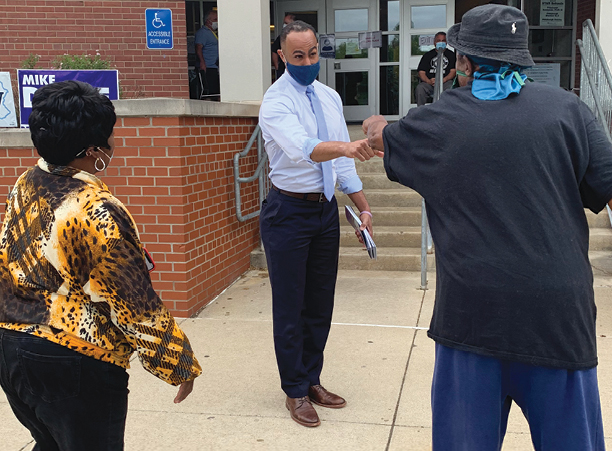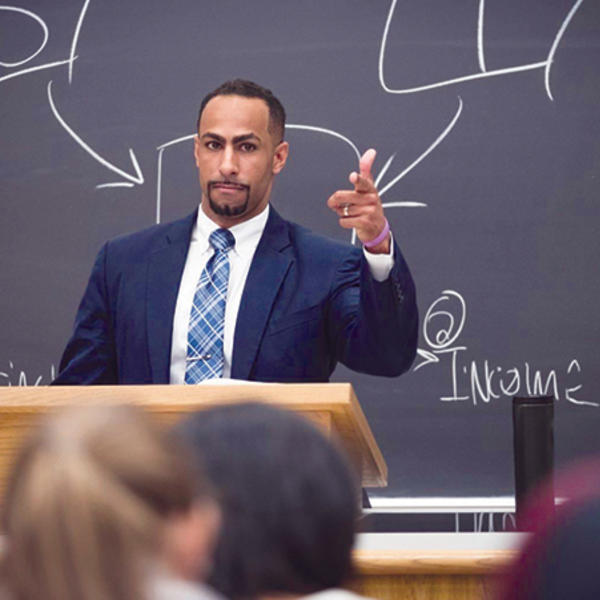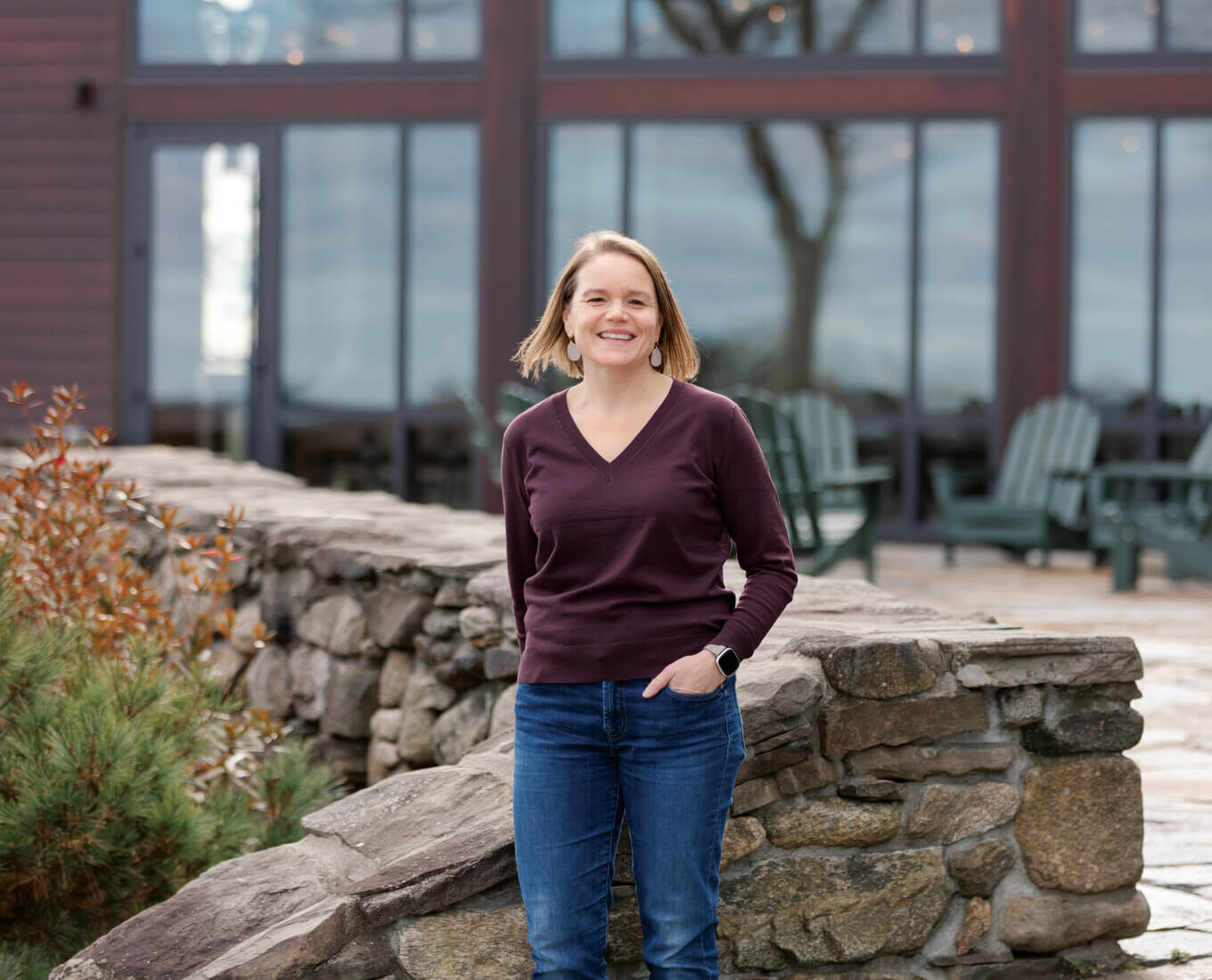Jerry Dickinson '09 was in the final push of the Democratic primary race to represent Pittsburgh and surrounding areas in the U.S. House of Representatives when the country erupted this May over the death of George Floyd. A constitutional law professor and civil rights advocate, Dickinson spoke at rallies and marched with Black Lives Matter protesters.
A self-described "eternal optimist," he was finding it hard to stay positive — until he visited with his 79-year-old white adoptive father.
"He told me, 'Now I understand. Now I get what you meant when you said you hadn't done anything wrong but were still pulled over by the police,'" Dickinson says. That moment of clarity from the man he calls his "best friend" emboldened him to keep fighting: "We were from two different races and generations learning to reconcile our differences and become one."
The political science and sociology double major says his early life and upbringing in the Dickinson household set the stage for him to become the social justice champion he is today. His biological parents, whom he has never met, were unable to care for him, so he entered the foster care system as a baby. Robert and Judy Dickinson took him in, along with 10 other foster children, and adopted him at age 3.
Life in the two-story ranch house, located in a predominantly white suburban neighborhood, was at times challenging, Dickinson says: "I was faced with difficult questions of race at an early age." His foster and adopted siblings represented an eclectic mix of socioeconomic and ethnic backgrounds, who had one common bond: "needing a loving home."
Dickinson with parents, Robert and Judy, and men’s soccer coach Elvis Comrie.
A soccer standout in high school, he was recruited by legendary Holy Cross coach Elvis Comrie to play on, and later captain, the Division I team. "I was looking for a mentor and Elvis was African American like me," he says. "I was captain for three years and we built a strong relationship."
Dickinson also was a board member of the Black Student Union and director of diversity for the Student Government Association at Holy Cross. His honors studies "fixated on race," he says, specifically issues of Black mobility and affordable housing. "For my thesis, I looked at ways federal housing programs encouraged/discouraged inclusion and desegregation in America," he says.
He continued this work as a Fulbright Scholar in South Africa, advocating on behalf of poor South Africans in eviction proceedings, and then as a law student at Fordham University in New York, where he represented Latino and Black women in eviction proceedings in Harlem.
Just as he was hitting his stride in New York, Dickinson's parents became ill and he moved back to Pittsburgh to help care for them. After finishing law school, he joined a high-profile firm, Reed Smith LLP, heading up a pro-bono housing rights project. He then moved to Philadelphia for a federal clerkship with the Honorable Chief Judge Theodore McKee of the U.S. Court of Appeals for the Third Circuit. Dickinson returned to Pittsburgh to join the faculty of the University of Pittsburgh School of Law, where he was recently promoted to associate professor and awarded tenure. He and his wife, Emily Dickinson '11, live in Pittsburgh's Swissvale neighborhood with their daughters, Nyla and Aria.
Dickinson is seen here knocking on doors and meeting with voters.
Housing rights remains his purpose, and he strives to "empower historically marginalized groups to have access to wealth-building and home-ownership opportunities." He serves as counsel to a community land trust group, a legal mechanism to preserve affordable housing, representing indigent tenants in eviction proceedings and conducting fair housing litigation in state court.
Dickinson believes injustices — be it housing or racial profiling — are all tied together in layers of systemic and structural racism that he aims to dismantle. Whether that will be as an elected official, he is not sure (he won nearly one-third of the vote against the 13-term incumbent in the Democratic primary for Pennsylvania's 18th Congressional District).
However, he draws inspiration from the late Congressman John Lewis (D-GA), who believed people go into battle knowing they are going to get knocked down. "The question is: How fast are you able to bounce back up?" Dickinson notes. For now, he intends to use his bully pulpit as an educator and advocate to bring about change to southwestern Pennsylvania, which, he says, is one of the least livable regions for African Americans. According to the U.S. Census, the city of Pittsburgh is only 23% African American or Black: "What I learned at Holy Cross is deeply embedded in my professional career and I plan to use the tools that I have acquired to continue to help those who are oppressed, disadvantaged and struggling."
Written by Sandra Gittlen for the Fall 2020 issue of Holy Cross Magazine.
About Holy Cross Magazine Holy Cross Magazine (HCM) is the quarterly alumni publication of the College of the Holy Cross. The award-winning publication is mailed to alumni and friends of the College and includes intriguing profiles, make-you-think features, alumni news, exclusive photos and more. Visit magazine.holycross.edu/about to contact HCM, submit alumni class notes, milestones, or letters to the editor.


